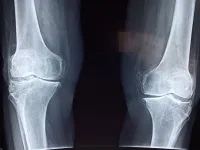(Press-News.org) Hamilton, ON (May 5, 2021) - Schools and child care centres should train staff on food allergies and have epinephrine available to treat anaphylaxis, but new guidelines do not recommend food bans.
The recommendations come from an international team, led by McMaster University, which has developed practice guidelines for the prevention and management of allergic reactions to food at child care centres and schools. The guidelines were published today in the Journal of Allergy and Clinical Immunology.
"The management of food allergy is a sensitive topic," said Susan Waserman, chair of the guidelines panel, an allergist and professor of medicine at McMaster University.
"Our goal is to help the school community understand the risk of allergic reactions -- and offer evidence-informed guidance for managing it."
The guidelines recommend that child care and school personnel receive training on how to prevent, recognize, and respond to allergic reactions. The guidelines also suggest that unassigned epinephrine autoinjectors, which are sold under the brand names ALLERJECT, Emerade, and EpiPen, be stocked on site.
The guidelines recommend there be no site-wide food prohibitions, such as 'nut-free' schools, or allergen-restricted zones, such as 'milk-free' tables, except in limited special circumstances.
Research has found little evidence that food bans work. Child care centers and schools may use other common-sense strategies to reduce the risk of reaction, such as providing adult supervision during snack and meal times, avoiding allergens in curriculum and fieldtrip activities, and promoting handwashing.
From one to 10 per cent of infants and preschool children and one to 2.5 per cent of school children have food allergy. Most people who develop a severe allergic reaction known as anaphylaxis survive, although there can be fatalities, especially if the reaction is not treated.
"Given that children spend much of their time in child care centers and schools, it is not surprising that food allergy management has become a topic of concern in these settings," say the guidelines.
"Anxiety and fear about the risk of accidental exposure to food allergens, and the burden of managing that risk, may limit children's participation in day-to-day activities. Children with food allergy are also at risk of allergy-related bullying."
The international guideline panel included 22 health-care professionals, school administrators, and parents of children with and without food allergy, along with a team of six researchers with methodology expertise. A systematic literature review of practices for managing food allergy in schools found a lack of high-quality evidence, so the guideline recommendations are graded as conditional.
In many cases, current policies and practices at schools and child care centres may not be supported by the best available evidence.
"It's not possible to totally remove the risk of allergic reactions," said Waserman. "However, interventions based on evidence may help community members manage the risk and support allergic students."
"As more research becomes available, some of the recommendations might need to be updated," she said. "We hope to see more high-quality research conducted in the future."
INFORMATION:
The guidelines are endorsed by the U.S. Allergy and Asthma Network; American Academy of Allergy, Asthma and Immunology; American College of Allergy, Asthma and Immunology; Canadian Society of Allergy and Clinical Immunology; and the World Allergy Organization.
The work was funded by the Allergy, Genes and Environment Network (AllerGen), a Canadian federally funded research network.
Note to editors:
The guidelines may be found post embargo at: https://www.jacionline.org/article/S0091-6749(21)00223-2/fulltext
Guideline panel members are available for comment including an RN who is also a parent of a child with food allergies.
For information, please contact:
Veronica McGuire
Media Relations
Faculty of Health Sciences
McMaster University
289-776-6952
vmcguir@mcmaster.ca
LEXINGTON, Ky. (May 5, 2021) - Collaborative research between the University of Kentucky (UK) and University of Southern California (USC) suggests that a noninvasive neuroimaging technique may index early-stage blood-brain barrier (BBB) dysfunction associated with small vessel disease (SVD). Cerebral SVD is the most common cause of vascular cognitive impairment, with a significant proportion of cases going on to develop dementia. BBB dysfunction represents a promising early marker of SVD because the BBB regulates a number of important metabolic functions, including clearance of toxic brain substances.
Advanced ...
Current guidelines for managing osteoporosis specifically call out hip or spine fractures for increasing the risk for subsequent bone breaks. But a new UCLA-led study suggests that fractures in the arm, wrist, leg and other parts of the body should also set off alarm bells.
A fracture, no matter the location, indicates a general tendency to break a bone in the future at a different location, said Dr. Carolyn Crandall, the study's lead author and a professor of medicine at the David Geffen School of Medicine at UCLA.
"Current clinical guidelines have only been emphasizing hip and spine fractures, but our findings challenge that viewpoint," Crandall said. "By not paying attention to which types of fractures increase the risk of future fractures, we are missing the opportunity to ...
Research led by the Garvan Institute of Medical Research has for the first time mapped the unique genetic profile of the skeleton's 'master regulator' cells, known as osteocytes.
The study published today in Nature Communications outlines the genes that are switched on or off in osteocytes, a type of bone cell that controls how other types of cells make or break down parts of the skeleton to maintain strong and healthy bones.
"This new information provides a kind of genetic shortlist we can look to when diagnosing bone diseases that have a genetic component," says the study's first author Dr Scott Youlten, Research Officer in the Bone Biology ...
Mammals see with their eyes, hear with their ears and smell with their nose. But which sense or organ allows them to orient themselves on their migrations, which sometimes go far beyond their local foraging areas and therefore require an extended ability to navigate? Scientific experiments led by the Leibniz Institute for Zoo and Wildlife Research (Leibniz-IZW), published together with Prof. Richard A. Holland (Bangor University, UK) and Dr. Gunārs P?tersons (Latvia University of Life Sciences and Technologies) now show that the cornea of the eyes is the location of such an important sense in migrating bats. If the cornea is anaesthetised, the otherwise ...
A study involving researchers at Karolinska Institutet and Gothenburg University in Sweden has found that low levels of a protein called PDGFRb are associated with particularly good results of radiotherapy in women with early-stage breast cancer. The study, which is published in the journal Clinical Cancer Research, also suggests that the efficacy of radiotherapy can be improved with drugs that block this protein.
Some 900 women in Sweden are diagnosed with DCIS (ductalcarcinoma in situ), the earliest possible form of invasive breast cancer. Standard treatment is ...
MINNEAPOLIS - Chronic kidney disease is when a person's kidneys progressively lose their ability to filter waste from the blood and eliminate fluids. Now a new study has found that people with reduced kidney function may have an increased risk of developing dementia. The study is published in the May 5, 2021, online issue of Neurology®, the medical journal of the American Academy of Neurology.
Chronic kidney disease affects approximately 15% of adults in the United States and it is more common as people age. However, since many people don't experience ...
CLEVELAND, Ohio (May 5, 2021)--Vitamin D is a critical part of a healthy diet. Among other benefits, it has been shown to protect against bone disease and maintain soft tissue health. A new study suggests that it may also play a role in the degree of postoperative pain postmenopausal women experience after undergoing total knee replacement. Study results are published online today in Menopause, the journal of The North American Menopause Society (NAMS).
Vitamin D deficiency is a major issue globally. It is estimated that 60% of adults have insufficient levels of the bone-building vitamin. Estrogen deficiency in perimenopausal women has been associated with decreased levels of vitamin D. A sedentary lifestyle and lack of sun exposure have also been shown to contribute to vitamin D ...
A new study published in the British Journal of Clinical Pharmacology ¬provides insights on how common hospitalized patients develop liver injury from taking different medications.
When investigators analyzed the records of 156,570 hospitalized patients, they found 499 cases of drug-induced liver injury (DILI), for an incidence of 0.32%. Anti-infective agents, cancer medications, and nonsteroidal anti-inflammatory drugs were the major categories of drugs causing DILI, and the highest incidence was due to voriconazole (an antifungal medication). Patients with high cholesterol, cardiovascular disease, ...
A new study published in Arthritis Care & Research indicates that few individuals with the autoimmune disease lupus who were publicly insured through Medicaid received recommended vaccines in 2000-2010. Also, those who were unvaccinated needed more acute care for vaccine-preventable illnesses.
From 2000-2010, there were 1,290 patients who visited the emergency department or were hospitalized for vaccine-preventable illness, and 93% of these visits occurred in patients without billing codes for related vaccinations. Patients who were Black had a 22% higher risk of needing such care than those who were white.
"These episodes represent missed opportunities to deliver essential ...
Untreated mental health disorders can be a serious problem for women and their children during pregnancy and after giving birth, during the postpartum period. A recent analysis funded by the Agency for Healthcare Research and Quality (AHRQ) and published in Psychiatric Research & Clinical Practice notes that few studies have examined the benefits of medications for mental health disorders in pregnant and postpartum women. And while many studies have reported on potential harms, the large majority could not separate the effect of medications from the effect of the underlying disorder. As a result, it ...

